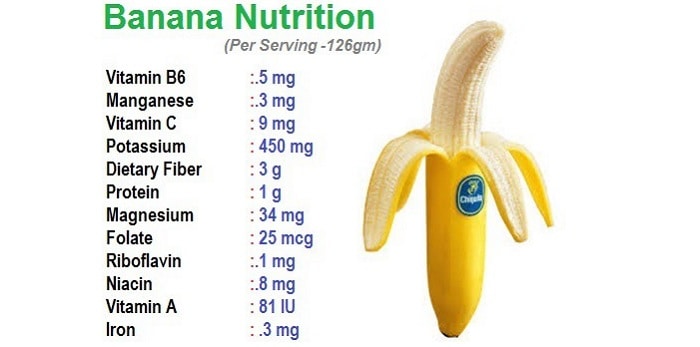Most diet experts say eating three bananas daily is good for health.
Banana is the most commonly used fruit in the world, and as per the global food consumption data, 90% of the world’s population eat bananas.
Ecuador’s population is the world’s largest consumer of this fruit, with an average of 101.5 kg per capita consumption per year. At the same time, in the US, it is about 10.8kg consumption per capita.
There is hardly anyone who does not love the sweet taste of this fruit. The popularity of this fruit is also due to its cost affordability, convenience to carry around and the easiness to eat it.
Banana is a highly versatile fruit that can be blended into smoothies or used as flavor-adding agents in various baked foods recipes.
In this article, we will briefly discuss the 11 important health benefits of bananas besides discussing the nutritional value of this fruit.
How Many Calories In A Banana?
The fear of sugar and calories in the banana makes many people apprehensive about eating this fruit.
Over 90% of calories in a banana come from its carbs. As a banana gets ripened, the starch in this fruit turns into sugar.
The sugar and calories in bananas also vary according to the particular variety of this fruit.
By the way, over a thousand varieties of bananas are found worldwide, but only about 20 good varieties are grown commercially.
Again, the banana varies in size and color too. The ripe banana contains 89 calories per 100 grams.
A medium-sized banana (7″ to 7-7/8″ long/118 grams) contains 105 calories.
The sugar in a medium-sized ripened banana is 14 grams, a little more than a tablespoon of normal white sugar.
How many carbs are in a banana?
Banana is rich in carbohydrates, accounting for most of this fruit’s calories. A medium-sized banana has 27 grams of carbs in it. That is about 23g of carbohydrates per 100 grams of banana.
Banana Nutrition – What Matters Most For Health
This yellow fruit is fairly nutritious and contains high fiber and antioxidants.
The major nutrients in this fruit include Vitamin B6, Vitamin C, fibre, potassium, and several other plant components.
Most dietitians agree that three bananas a day are good for health, especially because they can supply up to 1500mg of potassium, besides many other health benefits.
The bananas also contain good quality antioxidants like dopamine, catechin, and enzymes for improving digestion.
As per the USDA’s National Nutrient Database, bananas per serving (126 gm) contain the following major nutrients beneficial for health.

Health Benefits Of Bananas
The benefits of bananas for health come from this fruit’s good nutrients and useful plant components.
Our body’s heart and digestive system receive the maximum benefit from this fruit.
The American Academy of Pediatrics recommends bananas as the safest first solid food for a baby.
The great sources of banana benefits for health come from potassium, dietary fibre, manganese, and vitamins B6 and C present in this sweet and delicious fruit.
In the forthcoming paragraphs below, I want to share bananas’ major health advantages and benefits.
1. Bananas Improve Cardiovascular Health
The banana contains only a negligible amount of saturated fat and cholesterol, which makes it a good fruit for the heart.
The high fiber content in a banana is another merit of this fruit that helps lower the risk of coronary heart disease.
The antioxidants in this yellow fruit help reduce the harmful effects of LDL cholesterol (bad cholesterol).
2. Bananas Lower Blood Pressure
One of the common reasons for high blood pressure in most people is the presence of high sodium content in the blood.[8]
The banana, which is naturally rich in potassium (3 medium sizes banana=1500mg potassium), can maintain healthy blood pressure levels by neutralizing the sodium effects in the blood.
For a normal blood pressure rate, it is important to maintain the right level of potassium-to-sodium ratio in the blood. Of course, banana is the best natural food source for supplying the required potassium to the body.
3. Bananas Can Supply Magnesium Mineral
For good health of the body, an adult person requires about 300 to 430mg daily intake of magnesium. Consuming three bananas a day can provide our body with a good portion of the magnesium of daily requirements.
“Magnesium is a cofactor in more than 300 enzyme systems that regulate diverse biochemical reactions in the body, including protein synthesis, muscle and nerve function, blood glucose control, and blood pressure regulation.”
The strength of the bones, joints, and teeth also depends on the sufficient intake of this valuable mineral.
4. Bananas Help In Weight Loss
Some say bananas are NOT good for weight loss because of the carbs and sugar present in this fruit.
There are ‘NO’ proven studies on the relationship between weight loss and ripe bananas.
According to one study, unripe banana starch consumption is good for weight loss. Some of the participants on this diet were able to lose up to 2.6 lbs in 4 week period.
The ripe banana can be part of your weight loss diet plan as this fruit contains fiber, resistant starch and nutrients that promote a healthy metabolism.
This fruit can suppress the appetite as it is very filling and boosts energy levels.
5. Promotes The Growth of Healthy Body Cells
The regeneration and growth of body cells require Vitamin B6. This vitamin is crucial to the body because it assists in the production of insulin, nonessential amino acids, and hemoglobin necessary for developing body cells.
For a healthy immune system in the body, Vitamin B6 helps in generating antibodies that fight infections.
Banana contains about 5mg of Vitamin B6 per 100 grams.
6. Bananas are Rich In Resistant Starch And Fiber
Every banana can provide your body with about 3 grams of fiber.
The fiber required for proper digestion and healthy metabolism is necessary for a healthy body.
Lucky are the people who use raw green bananas in food preparation. The unripe banana contains a lot of resistant starch (indigestible carbohydrate) that acts like fiber.
The health benefits of resistant starch are great for the body. Some of its major health benefits are suppression of appetite, improved colon health, lowers insulin resistance, and help balance blood sugar levels.
The banana also contains pectin fiber, known for its health benefits in appetite reduction, blood sugar moderation, and colon cancer prevention.
7. Bananas Improve Digestion
This fruit’s resistant starch and pectin fiber improves the digestive process and makes us feel full and satiated. These compounds also have prebiotic nutrients that feed the helpful bacteria in the digestive system.
The fibrous nutrients in the banana are fermented by the friendly bacteria in the colon that leads to the generation of butyrate.
Butyrate is a type of short-chain fatty acid that helps in the healthy functioning of the digestive system. It can also prevent colon cancer and ulcers in the stomach.
This fruit is an easily digestible food and non-irritating for the human gastrointestinal tract.
8. Bananas Are Rich In Vitamin C
A full serving of bananas can provide your body with 15% of the daily requirement of Vitamin C.
The health benefits of Vitamin C include:
- Protecting the body from immune deficiencies.
- Preventing prenatal health problems.
- Better health of the eyes and skin.
- Helping in preventing cardiovascular disease.
Vitamin C also functions as an antioxidant that neutralizes the harmful effects of free radicals in the blood.
This essential vitamin is necessary for producing collagen that holds muscles, bones, and other tissues together.
9. Bananas Help In Fighting Anemia
The reason for anemia disease is the low hemoglobin count in the blood caused by the deficiency of iron minerals in the body.
A good amount of iron minerals in bananas is beneficial for producing hemoglobin in the blood.
Every 100 grams of banana you eat contains about 3 mg of iron.
The anemia disease also gets weakened because of the Vitamin B6 from the banana that begins to regulate the glucose levels in the blood.
10. Boosts The Performance Of Athletes
The most favorite fruit of all athletes is bananas.
This fruit is easy to carry around and eat whenever and wherever you want to.
Most importantly, it strengthens and energizes the muscles and provides beneficial antioxidants and nutrients for enhancing performance in sports.
One of the studies conducted at Appalachian State University’s Human Performance Lab found a valuable finding. The study members, who were professional cyclists, were given half a banana after every 15 minutes of cycling. The results showed their energy levels were similar to or even higher than those who drank a carbohydrate-matched sports drink every 15 minutes.
There is no wonder why tennis players and athletes keep eating bananas quite often.
11. Relieves Anxiety And Lifts The Mood
The magnesium mineral in the banana is good for relieving anxiety and lifting the mood, besides helping you sleep well.
Many studies have pointed out that low levels of magnesium in the body are one of the reasons for anxiety, depression, irritability, and insomnia.
Eating 3 or 4 bananas daily can give your body a good portion of daily magnesium requirements.
Is Banana Safe For Diabetes Patients?
Most diabetes patients hesitate to eat bananas because of the sugar and carbohydrate in this fruit.
The glycemic index, which measures the effects of various foods on blood sugar rise, has ranked bananas at a low to medium level at the index value of 42–62.
For diabetes patients, it is safe to eat 2 or 3 medium-sized bananas daily.
It is important to ensure minimal sugar and starch intake from other food sources in the diet and not exceed the permissible level.
Diabetes patients should monitor their blood sugar levels daily and never eat a banana if the sugar level has already exceeded the healthy benchmark level.
Side Effects Of Bananas On Health
Banana is the most commonly eaten fruit. It is very friendly to the digestive system of the body.
This fruit is even recommended as the first safe, solid food that could be fed to babies.
In very rare cases, some people allergic to latex may also be allergic to some varieties of bananas.
As per one of the study results, about 40% of people with latex allergies could also be sensitive to plant foods.
People on rigid ‘low carbs and low sugar diets’ should avoid bananas as these fruits contain a good bit of sugar and starch.
Overall, banana is a very safe and healthy fruit for all.
